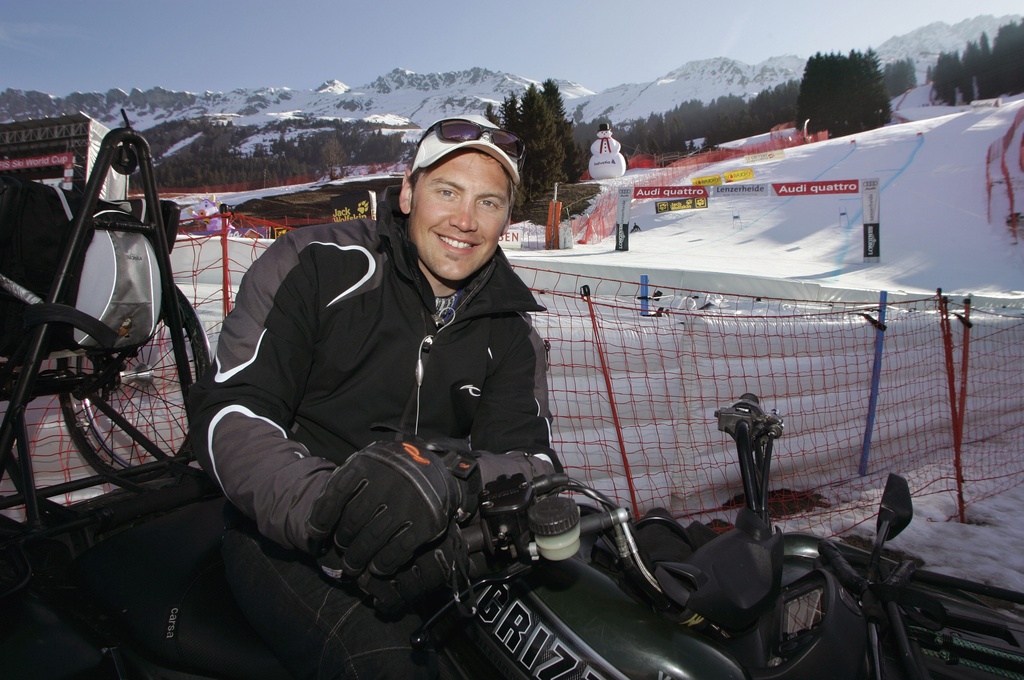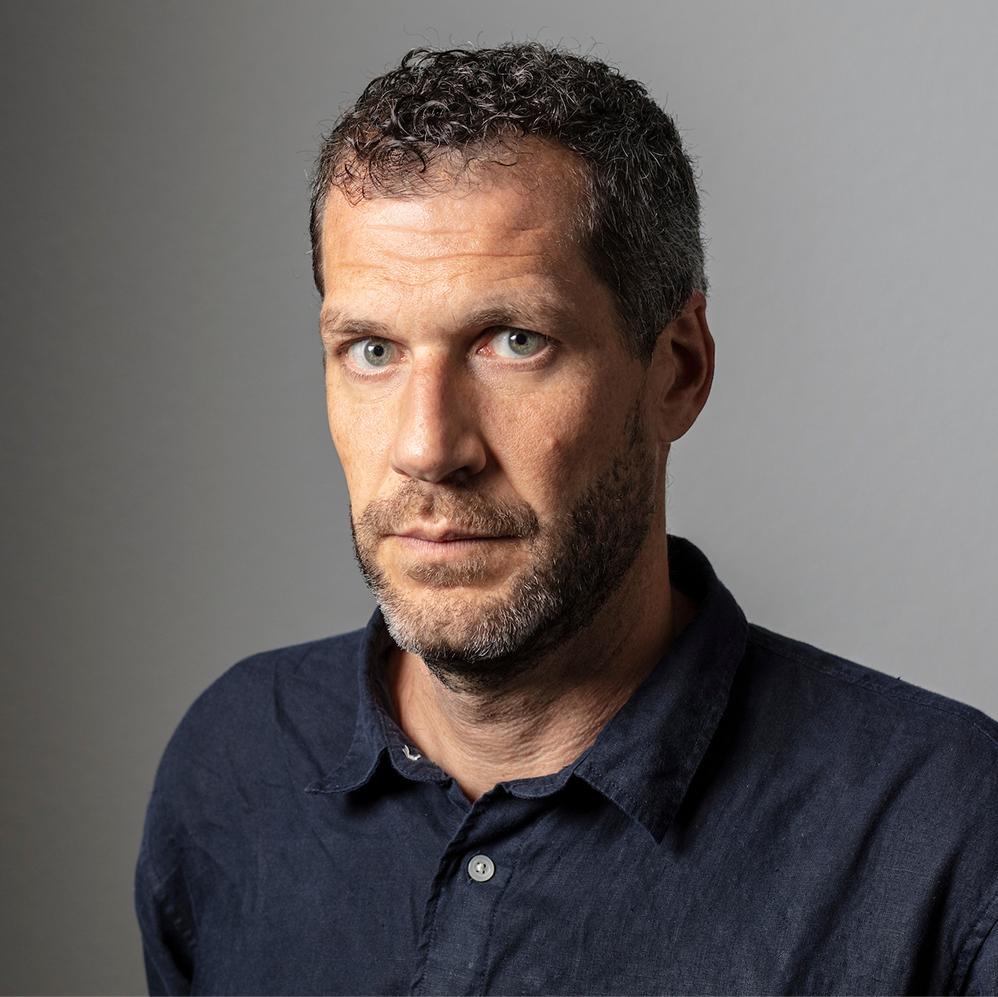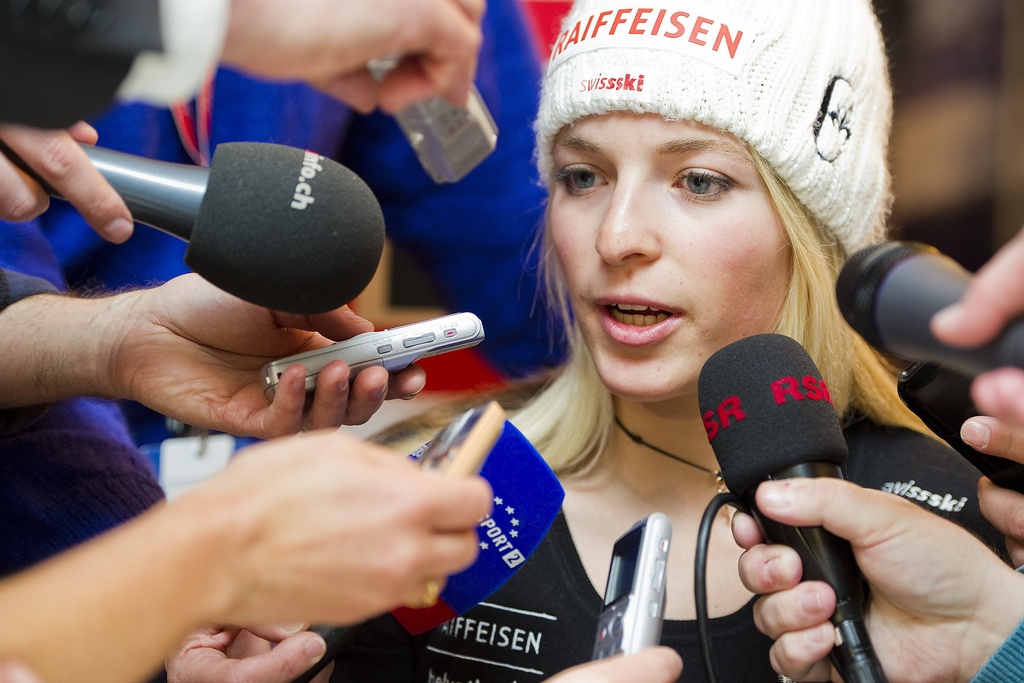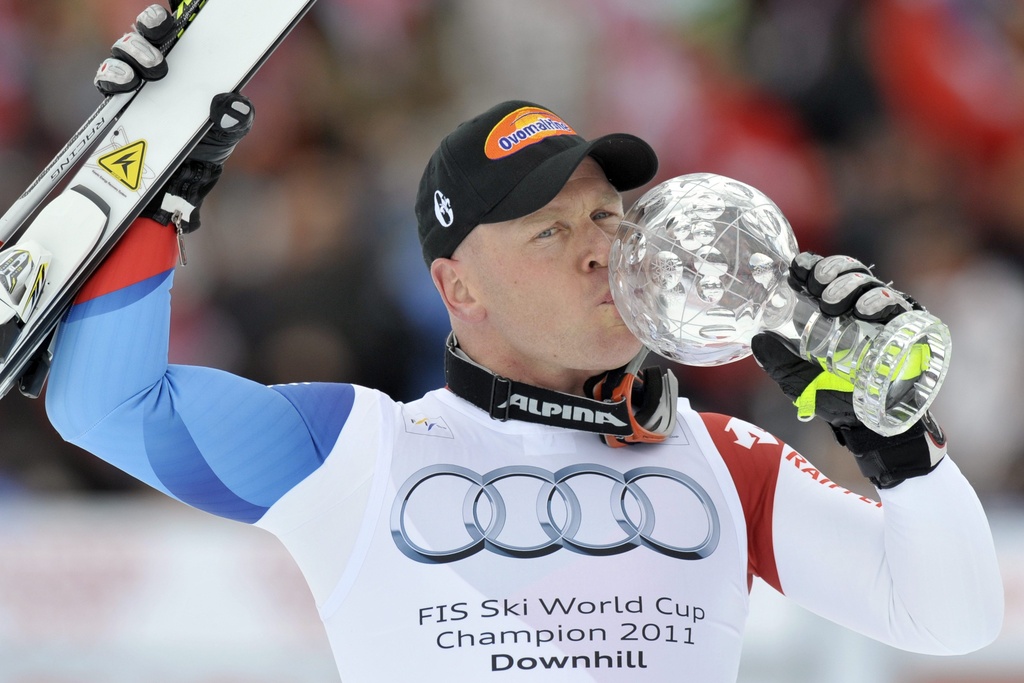Paralysed Beltrametti rediscovers love for life

Ten years after a skiing accident left him paralysed from the waist down, Silvano Beltrametti is now the organiser of the World Cup Alpine Finals in Lenzerheide.
Beltrametti tells swissinfo.ch that his job in the resort in eastern Switzerland is one challenge among others that have allowed him to rediscover his love for life.
In the finish area of the course, Beltrametti is very much in demand. In good humour and smiling, as is his custom, he tries – between handshakes – to follow the race in progress. It’s on a course that was named after him in 2007.
Born and bred in the region, he has taken the reins at Lenzerheide, which is hosting the World Cup Alpine Ski Finals for the third time.
Sitting in his “all-terrain” wheelchair, the unassuming sportsman describes his new life and also the safety problems which still haunt the racers in what is known as the “White Circus”.
swissinfo.ch: As the new head of the organising committee, how do you feel about these final events in the World Cup Alpine skiing calendar?
Silvano Beltrametti: The final days of preparation were very difficult. We had to make sure that the piste stayed in good condition and the weather forecast was not good. What we saw on Wednesday, with the performances of Didier Cuche [taking the overall title in the downhill] and the other Swiss, was quite honestly fantastic. Spectators once again came in droves, there was plenty of suspense and no accidents. What more could we expect? [Thursday’s races were cancelled owing to bad weather, handing the Super-G overall title to Cuche.]
swissinfo.ch:How important are these races for you and the surrounding area?
S.B.: They are of tremendous importance. It’s one of the main marketing tools of the Lenzerheide tourism region. A lot of money has been invested in these World Cup races. Apart from the publicity and the financial gains we hope to make, it’s heart-warming to see all those fans come to cheer for Swiss skiing.
swissinfo.ch:The piste here is named after you. What effect does that have on you?
S.B.: It’s obviously an enormous honour which is given to very few people. I’m very proud and grateful to have received this present from Lenzerheide.
swissinfo.ch:How would you describe the course?
S.B.: It is technical and very demanding. There are no easy passages for the downhill which means that athletes have to fight all the way from top to bottom of the piste. It fulfils all the demands for the final races of the World Cup Alpine season because it can satisfy four very different disciplines. The Super-G is extremely attractive, the giant slalom is very difficult and the slalom is not without its interest either.
swissinfo.ch: And it’s rather well suited to Swiss skiers…
S.B.: You’re right. Generally we can say that the season for the Swiss was rather good, taking into account the high expectations at the beginning. The World Championships certainly have not gone according to plan but you can also put that down to bad luck. What is most heartening is seeing new names making their mark. It’s a good omen for the future of Swiss skiing.
swissinfo.ch: There was a dispute recently between Günter Hujara, chief race director for the men’s World Cup at the International Ski Federation (FIS), and Didier Cuche over a jump Cuche considered too dangerous. How did you see this against a background of safety for the racers?
S.B.: Over the past two weeks I’ve had so much to do that I really didn’t have much time to follow the affair. But it is clear that the safety of the racers is paramount. It’s a job which has to be shared by both the organisers and the FIS. There are sometimes squabbles between the FIS and the skiers but they are nothing serious. We have to cooperate and listen to all sides.
swissinfo.ch:But wouldn’t it be possible to do more for the safety of the skiers?
S.B.: Safety is priority number one for the organising committee in Lenzerheide. Thirty kilometres of safety nets were installed the length of the piste. It was a gigantic task. It would be difficult to do more, if only for financial reasons.
You can never rule out accidents. Ski races are run in the open. Skiing is one of the most difficult sports and the speeds are phenomenal. When accidents happen or there are falls, they often lead to serious injuries.
swissinfo.ch:On a more personal note, after your terrible accident ten years ago, you went in a different direction in your life and career. How do you feel?
S.B.: There are many different challenges, both private and professional, that keep me busy. I am very happy with life. My wife and I run a nice hotel. I’m happy in my environment and I’m once again active in the sport I started off in. If I look at the years that have gone by since my accident, I can only be delighted to live this life which is normal and independent. Even if, of course, nothing will ever be like it was before the accident.
swissinfo.ch:After such a blow, how did you succeed in finding a new start?
S.B.: There are several stages. At the beginning, you have to draw a line under daily routine. To make that possible you have to realise what you’ve experienced in the past and what is no longer possible in the future. It was quickly clear to me that skiing was a thing of the past and I had to give up all my career plans.
Slowly I turned my gaze forwards; I set new goals and in so doing I returned to life. But that demands an enormous will-power because you start all over from zero. After my accident, I was like a child who has to learn everything. It wasn’t easy but if you’re fundamentally a positive person like me, you get there.
Born on March 22, 1979, in Valbella, canton Graubünden, Beltrametti was a very promising alpine Swiss skier before suffering a serious accident during a downhill race in Val d’Isère in 2001.
He went through the protection barriers and ended up under a metal pylon. His back suffered so badly that he was paralysed from the waist down.
Beltrametti later went into sports management with the GFC Sports Management company.
He also runs a hotel with his wife and is founder of the specialist internet site www.skionline.ch.
Beltrametti joined the organising committee of the World Cup Alpine Ski Finals in Lenzerheide in 2007, taking over as its chairman in 2011.
(Translated from French by Robert Brookes)

In compliance with the JTI standards
More: SWI swissinfo.ch certified by the Journalism Trust Initiative




You can find an overview of ongoing debates with our journalists here. Please join us!
If you want to start a conversation about a topic raised in this article or want to report factual errors, email us at english@swissinfo.ch.